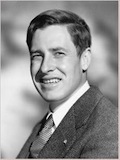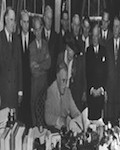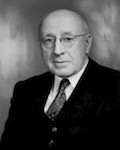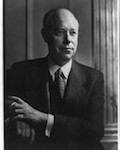Congressman Will Rogers, Jr. (1911-1993) was a vigorous advocate of U.S. action to rescue Europe’s Jews, and was closely associated with the Bergson Group.
Rogers, the son of the famous entertainer, was elected to the U.S. House of Representatives in 1942, representing California’s 16th District, in Los Angeles. A New Deal Democrat and strong supporter of President Roosevelt, Rogers arrived in Washington with little interest in the plight of Europe’s Jews.
In the spring of 1943, rescue activist Peter Bergson and his colleagues began promoting the rescue issue on Capitol Hill. He met Rogers in May. Rogers later recalled: “We knew the Jews were under attack, the Germans were killing them, the Poles were throwing them out, and all this kind of thing was going on. But I was just like anybody else–all right, what could I do about it?…Peter Bergson stimulated me, I think more than that, I think he stimulated my wife and she began to talk about it, and I began to talk about it. And I began to be more interested….I didn’t want to be in public making speeches but slowly, slowly it dawned on me that it was my duty to go out and speak against the destruction of the Jews….He was a good speaker and a very good arguer. And the arguments that I would bring up, that it couldn’t be done, that it shouldn’t be done, that it would be anti-Roosevelt, he rebutted those arguments very skillfully.”
Rogers later suggested that his own Native American heritage helped sensitize him to the plight of mistreated minority groups: “The Jews were being kicked around in Europe and the United States should do something about it and the other people should do something about–whether they were Jews or Cherokees or whatever it was. And it was not on the Jewish basis at all…It was a humanitarian, a worldwide basis.”
In August 1943, at Bergson’s behest, Rogers undertook a highly-publicized trip to London to confer with British government officials and refugee advocates about what steps could be taken by the Allies to advance rescue. In a newspaper column Rogers wrote that month from London, he zeroed in on one of the main obstacles to rescue action: “The big trouble–a fatal trouble–has been that there is no one agency, no single man, in a single room, or office, given the entire responsibility for this job of saving the Jews. Instead, the responsibility has been aimless, and has resulted in befuddled confusion and buck-passing which spells utter inaction.”
The Bergson Group sought to address this problem by introducing a congressional resolution urging Roosevelt to establish a government rescue agency. Rogers became the lead sponsor of the resolution in the House, and Guy Gillette (D-Iowa) was the lead sponsor in the Senate.
The administration strongly opposed the resolution. For Rogers, perhaps the most difficult aspect of championing the cause of rescue meant that it put him at odds with FDR. “I did not feel comfortable in opposing President Roosevelt,” he recalled. “I was a New Dealer right down to the bricks and I believed in him very, very strongly….And it was difficult to have to come against your own party and your own leader in which you believe so strongly. But I thought that he was very wrong on this point. I thought that he should have interested himself immediately and made stirring declarations and set up a committee or a, a group somehow that could save these people when he knew they were being killed and being killed en masse.”
When Rogers introduced the resolution, in November 1943, he was not at all optimistic about its chances for passage: “I didn’t think the resolution was going to pass in the first place. But I thought it had to be introduced. It was a good thing and it was a good thing to fight. You fight the good fight….I was not concerned with the outcome so much as I was at making a statement….I did very much want the United States as a country and as a nation to stand, to protest, and to stand for the rescue of these people when it could be done.”
House Foreign Affairs Committee chairman Rep. Sol Bloom (D-New York), a staunch defender of the administration’s refugee policy, tried to undermine the resolution by insisting on full hearings. That backfired when Assistant Secretary of State Breckinridge Long, in his testimony, presented wildly misleading statistics regarding Jewish immigration to the United States. American Jewish groups forcefully refuted Long’s claims. This front-page controversy, coupled with the Bergson Group’s newspaper advertising campaign and behind the scenes lobbying by Treasury Department officials, convinced President Roosevelt, in January 1944, to establish the War Refugee Board.
Congressman Rogers believed the Bergson Group played a crucial role in this process: “The major achievement of the Bergson Group was making things so hot for the administration that they could no longer do nothing. There had to be some action. Whether it was going to be the resolution that I and Senator Gillette introduced or something else, they had to move. And so they set up the War Refugee Board. And that was due, thanks to the actions of the Bergson committee.”
After the war, Rogers, although no longer a member of Congress, became active in two more Bergson political action committees: the American League for a Free Palestine, which worked to rally American public opinion in support of Jewish statehood; and the Hebrew Committee of National Liberation, which sought to increase pressure on the British to withdraw from Palestine.
Sources: Wyman, The Abandonment of the Jews, pp.194, 199; Wyman and Medoff, A Race Against Death, pp.142-144, 153-154.











